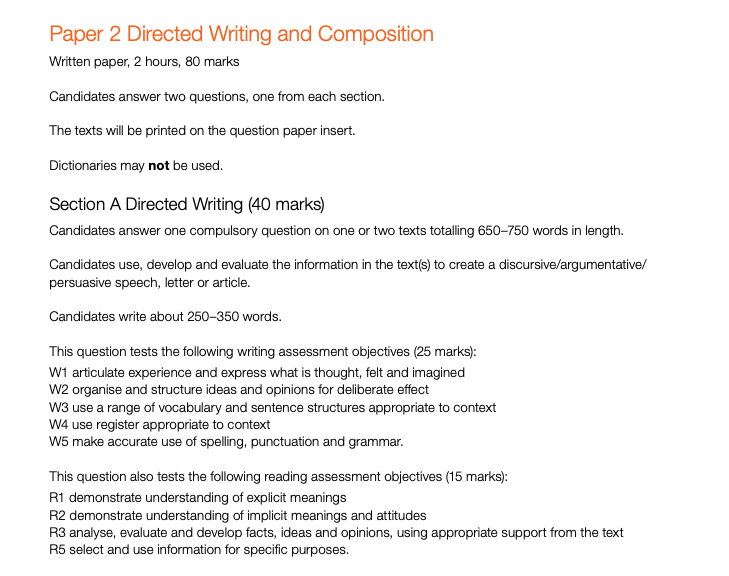Hello there! Today, we’re going to introduce you to the wonderful practice of *drumroll* directed writing!
Here’s what that’s all about!
In directed writing…

So why is this directed writing? It’s directed writing because it’s specifically directing you to create a particular type of text – either a discursive/argumentative/persuasive speech, letter, or article.
By the fundamental counting principle, there are a grand total of 9 types of things that you can be asked to do, then.
i) Discursive speech
ii) Discursive letter
iii) Discursive article
iv) Argumentative speech
v) Argumentative letter
vi) Argumentative article
vii) Persuasive speech
viii) Persuasive letter
ix) Persuasive article
But you’re not just going to write these essays offhand!
Have a look at a sample question below, from Summer 2021, Paper 2, Variant 3.
Question 1
Write a speech to give to an audience of young people suggesting how they can make changes
effectively in their lives.
In your speech you should:
• evaluate the views given in both texts about making resolutions
• give advice, based on what you have read, about how young people might manage the
changes they want to make in their lives.
Base your speech on what you have read in both texts, but be careful to use your own words.
Address both of the bullet points.
Write about 250 to 350 words.
Up to 15 marks are available for the content of your answer, and up to 25 marks for the
quality of your writing.
Oh fun!
As you can see, the question is asking you to write a speech. Moreover, it is asking you to make a speech to young people – how incredible! What a privilege you have in front of you to influence the next generation!
…Does this mean that you can go ahead and tell people that they should all go on TikTok and achieve their dreams by doing the magic bomb dance?
See:
…Unfortunately no, because the text is also asking you to evaluate the views in both texts about making resolutions, and it is asking you to give advice, based on what you have read, about how young people might manage the changes they want to make in their lives.
That is very specific, and you can’t go against that, but there is plenty of excellence that you can achieve!
Well, how do we do that? We have to read the text! Have a look here:
Text A: Anyone up for a New Year challenge?
The article below discusses some strategies for keeping resolutions.
No one seems sure when the idea of making resolutions at the turn of a new year began. The
ancient Babylonians are believed to have celebrated the beginning of a new planting season
by resolving to make changes for the better. The Roman god Janus – the one that looks both
backwards to the past and forwards to the future – inspired citizens to promise improvements in
the coming year. In the modern world, many countries and cultures celebrate their new year with
‘wishes’ rather than resolutions, but social media, perhaps inevitably, has ensured that personal
struggles to exercise more / study harder / eat more healthily / be kinder have become collective
experiences.
Most people will not succeed with challenges for more than a few weeks: willpower is not a talent
that a lucky few are born with, according to some research. Willpower is a skill to be practised.
Frank Ryan, author of ‘Willpower for Dummies’, explains: ‘Our level of willpower fluctuates
according to our motivation in any given situation. Everybody can learn to use their willpower
more effectively.’
To maximise our chances of sticking to resolutions, Ryan says, we should identify our ‘willpower
profile’. ‘Some people are more impulsive than others. That comes down to personality. For
some, scheduling time to reflect on your progress by keeping a diary can be helpful. For others,
signing up for a group where everyone has a common goal can help to strengthen your resolve,
as can sharing even small progress with others.’
Magdalena Bak-Maier, a neuro-scientist and coach, encourages people to make a written plan
which sets specific goals. ‘You might have announced: this year I’m going to write a novel or I’m
going to run a half-marathon, but those are just ideas, not plans. A plan is: I’m going to get up
at 6:30 Monday to Friday and write 500 words of my screenplay before I leave for work. Or I’m
going to sign up for 10 water-colour classes and go every Monday at 18:00.’
Finally, be kind to yourself. ‘Anticipate lapses and plan for them,’ says Ryan. ‘Changing habits,
or establishing new ones, is a motivational marathon, with inevitable trips along the way.’ It’s
important to stay optimistic. ‘Feeling negative and self-critical actually reduces your willpower,’
says Ryan. ‘Negative moods are the enemy of willpower and self-blame is the main culprit.’
Text B
The article below is about some of the benefits of making resolutions.
I like a challenge, and what better way to push myself than at the start of the New Year with
wholly ridiculous resolutions?
One year, I randomly decided I’d practise yoga every day for the following 12 months without
ever having tried yoga before – very ambitious. Last year I promised myself I’d go bouldering
every single Thursday … indefinitely. And of course, for the past two years, I’ve attempted to have
a plant-based diet for the first month of the year knowing I love cheese more than most things in
this life. Needless to say, all my grandiose New Year’s resolutions have been a tremendous flop.
Essentially every year I set myself up for failure. Normally I feel exceptionally guilty about how
much of a slob I’ve become by the end of the year and try to rectify it by attempting resolutions
that are ambitious at best and delusional at worst.
Luckily, I’m not alone with my futile declarations as 80 per cent of New Year’s resolutions fail
within weeks. I lasted 27 days the first time I attempted a plant-based diet – all it took was one
encounter with a margherita pizza and all my hard work was undone 4 short days before the
end of the challenge. And when it came to bouldering, I got a (not so cheap) 10-day pass to a
climbing centre, and let’s just say a year later there’s still about four visiting passes left to use.
Yes, my resolutions never go to plan, but they have taught me a wealth of new, sometimes
pointless, skills. I’m often too hard on myself and forget all the days I did actually stick to my
challenges and what I’d gained from them. I lasted 27 whole days as a vegan yet I was more
upset about the four days that I didn’t manage. I stuck at it the next time though, learning from my
mistakes.
The fully vegan diet didn’t stick but I now know how to realistically work more plant-based meals
into my diet rather than going cold turkey (excuse the pun) and spending a whole month in near
starvation. And I didn’t do yoga every day, because that’s ridiculous, but I did practise it daily for
the first few months and continued on and off long after that – it truly made me feel stronger and
happier in myself. I definitely don’t go climbing as often as I’d like to but the point is I still go when
I can.
Being realistic in my expectations is where I really fail every year. Daily challenges, massive
changes to my diet and physical activity can’t just happen overnight.
Okay, so here’s how you do well on this.
Let’s start.
- Understand the question:
Before you start writing, read the question carefully and understand what you are being asked to do. Look for specific details, such as the audience, purpose, and format of the writing. Keep these in mind throughout your writing process and make sure to refer back to the question time and time again as you write.
The reality is that many students actually lose track of the writing prompt as time goes by, and thereby become unable to write coherent or correct responses – not just because they don’t understand what the prompt was in the first place, but often because they just lost track after a while! - Plan your response:
To ensure that your writing is well-organized and coherent, create a brief outline or plan before you begin. This can include jotting down the main points you want to cover and the order in which you want to present them. Planning will help you maintain a clear focus and avoid straying off-topic. - Use the appropriate format and register:
IGCSE directed writing tasks may come in various formats, such as letters, articles, reports, or speeches. Be familiar with the conventions of each format and adhere to them in your writing. Moreover, consider the register (formal or informal) required by the task and ensure your language, tone, and style match the intended audience and purpose. - Develop strong arguments:
Make sure to develop strong and relevant arguments to support your ideas. Use a combination of facts, examples, and personal experiences to make your arguments persuasive and engaging. - Use varied sentence structures and vocabulary:
To achieve a high mark, demonstrate a wide range of vocabulary and sentence structures. This will not only make your writing more engaging but also showcase your linguistic abilities. Avoid using clichés, jargon, or overly complex language that may confuse your reader. - Maintain coherence and cohesion:
Ensure that your writing flows smoothly from one point to another by using appropriate linking words and phrases, such as ‘however,’ ‘in addition,’ ‘on the other hand,’ etc. This will help create a coherent and cohesive piece of writing that is easy to follow and understand. - Proofread and edit:
Once you have finished writing, take the time to proofread and edit your work. Check for spelling, grammar, and punctuation errors, and make sure your writing is clear and concise. Don’t be afraid to make changes if necessary. - Practice and seek feedback:
The more you practice, the better you will become at directed writing. Try completing past IGCSE directed writing tasks and ask your teachers, peers, or tutors for feedback. This will help you identify areas for improvement and gain valuable insights on how to enhance your writing.
We will update this post a little later with an example directed writing sample, written to the prompt but we hope that you’ve enjoyed this piece so far!
Look forward to it!



